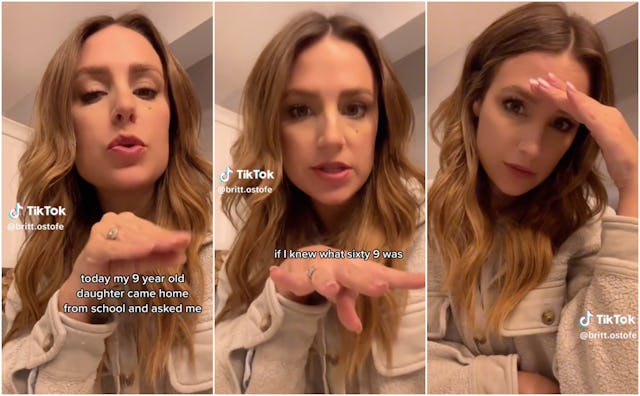Watch This Mom’s Hilarious Response To Her Daughter Asking What “69” Means
The secondhand mortification is real.

Kids ask a lot of questions. So many freakin' questions. But none of those questions will prepare you for when your kid asks where babies come from. The "sex talk" has haunted parents for centuries. Making this milestone convo even more daunting? The prospect of your child finding out — and asking you — about *other* stuff that happens in the bedroom. Just ask TikToking mom Britt Ostofe (@britt.ostofe), who had to find out the hard way that, well, there is no easy way to explain "69" -ing to a grade-schooler.
From a failed cooking analogy to a classic "I'm not saying until you say" stand-off, Britt hysterically documented what happened when her kid came home declaring that they knew what 69 was. And while it's never too early to talk about sex with your kids, this conversation is hilarious proof that no one adequately prepares you for the sh*t that comes after childbirth.
"Today, my nine-year-old daughter came home from school and asked me if I knew what 69 was. The f*ck?" starts Britt. After quickly calling her kid's bluff and reminding her that 69 is the number before 70, her daughter challenged her for more information.
Obviously, Britt didn’t want to explain foreplay to her kid if she could avoid it. However, her nine-year-old actually had a pretty good idea of what 69 was. "Well, I heard it's when a boy and a girl are together, and they're trying to have a baby," explained Britt's child.
OK, logistically, she's wrong — but theoretically, she's in the ballpark. Cue the motherly mortification. "I'm panicking. I could fill an entire swimming pool with the sweat coming off from my upper lip," recaps Britt.
"At the end of the day, she's gonna learn about this sh*t from somebody else, or she's gonna learn from me," she decides before diving into what seems like a safe explanation. "So, I told her a cooking analogy. 'You know when you're cooking a meal, and there's prep time and cook time? Where in prep you're chopping the veggies and cook time is getting to the main meal, the main deed.'"
Her daughter's response: "I don't cook."
Britt pivots, telling her daughter, "Only adults are allowed to prep and cook in the kitchen. And you will get there when you're an adult, OK? But right now, you're a kid. Kids don't make dinner. You don't need to worry about it."
Of course, it didn't end there. Her daughter pointed out that Daddy doesn't cook. Does that mean Daddy doesn't help make babies? So... maybe not the greatest analogy. In the end, Britt gave up (rightfully so) and said, "Cooking's not for you. Find a new hobby."
Uh, how should these conversations unfold?
All of this begs the question: How do you have age-appropriate conversations about sex — and other stuff — with your kids? From trying to figure out how to explain 69 to a nine-year-old to making sure a freshly appointed “big sister” doesn’t think her mama ate the baby in her belly, the sex talk can be overwhelming in many ways. And effing awkward.
Luckily, there are experts out there willing to help you out. Here are a few pointers from Planned Parenthood to help:
- Use accurate terms for anatomy. Sure, teaching your toddler to say “front butt” is hysterical, but it can create confusion down the road.
- Use simple language and short explanations. An example might be, “Birth is when a baby is done growing inside Mama and comes out of her belly or vagina.”
- Be proactive. Instead of waiting for your child to ask, look for opportunities to bring up things like birth control, gender identity, pads/tampons/menstrual cups, and more.
- Never assume your child knows the right answer. Doing a little digging could quickly reveal that your child doesn’t know as much as they think, giving you an opportunity to broach the subject in a gentle, age-appropriate way.
- Follow-up. Sometimes answers lead to more questions. Before closing the convo, ask things like, “Does that make sense?” Or, “Do you have any more questions?”
What if you freeze in the moment?
We hardly ever get things right the first time. It’s OK to circle back an hour, week, or month later and say, “Remember when we talked about [insert subject]? I don’t think I explained that right. Can we talk about it again?”
Just keep in mind that your child, especially an awkward tween or teen, may not want to talk about it right then. That’s cool, too — as long as they know you’re there to talk when they’re ready.